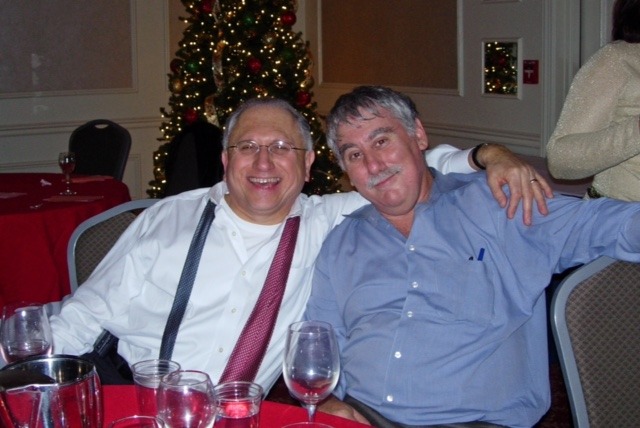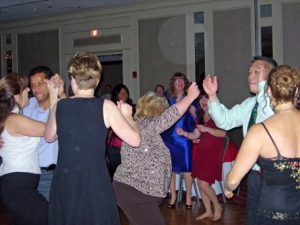I spend a lot of time with my memories. I have very few regrets and an abundance of warm fuzzy moments that come to mind when I reflect on all the mostly rewarding and joyful years that I spent in the practice of medicine. Some of my warmest memories are from the pleasure of celebrating the holidays at the many office parties over the years. The picture in the header is from a holiday party put on by our South Shore practices some fifteen or so years ago. Some of my best practice memories are from the twenty five or so years of Wednesday afternoons that I spent seeing South Shore cardiac patients at our Braintree site. I guess that is why I was at the party.
I began to practice at Harvard Community Health Plan in 1975 when we only had two practice sites, Kenmore and Cambridge. The holiday party was one of just three or four events during the year that brought us all together. It was the only event where the agenda was to have a good time. All the other meetings were about group practice issues. It was at holiday parties that I put a face with a name or voice from a written consult or phone all. In retrospect a culture is better built with a holiday toast than with a corporate memo
As our practice grew to five and then ten and more sites we needed larger venues. The last corporate wide holiday party that I can remember was probably in the early eighties and was held at the Commonwealth Pier Exhibition Hall. That last party was more like attending a convention than an intimate holiday party. One of the problems with large healthcare organizations is maintaining a “sense of group.” By the time there are hundreds of thousands of patients being managed in many sites by thousands of clinicians and twice as many administrative professionals, something is lost.
I guess that the “powers that be” figured it the same way I did after that last event. In subsequent years individual sites had holiday parties or occasionally two sites or a region might celebrate together. Some of our specialty practices or large primary care practices would go it alone and those parties were good and better for activities like a “Yankee Gift Swap.” It was always interesting to see how the support staff had to remind the physicians to do their part and then goad them to join in the fun once the festivities began. A party is a great social leveler. Getting some of the doctors to dance became the equivalent of a community project for some of our more dedicated medical assistants. See the picture below.
I know that the time has passed for me to wear a stethoscope and make rounds at the hospital. As Stein’s Law teaches us, something that can’t go on forever won’t. Accepting that reality I do not miss office practice, and I am totally content with the fact that I will not attend more senior management meetings. But, I do miss the holiday parties!
These paragraphs reveling in the warm fuzzy memories of holiday parties at work long ago are the result of some reflections that I have been doing about what is good in life. There is a whole new “economics of happiness” that is evolving. Hard work against impossible odds does not always make us unhappy and all the material benefits of success do not always make us happy. At times I ask myself some questions. Should I have focused on making more money? Did I give up on being a surgeon too soon? Should have I given more effort to climbing an academic ladder? Perhaps I should never gone into medicine. Would I have been happier as a college professor of English literature? Perhaps I should have followed in my father’s footsteps and become a theologian. It doesn’t take but a few seconds to say no to all of those “what ifs” or “maybe I should haves” when I think about the joys of practice.
The idea of celebrating office parties as a forgotten part of the joy of practice came to me while walking last weekend. I was thinking about what to write in a post that would come out on Christmas Day. I remembered some Christmas days when I made rounds at the hospital. There was one Christmas during my training when I spent the whole day at the hospital and my family came to see me. It would be easy to focus on what practice takes from us while forgetting what it gives back. One of the greatest gifts of practice is our chance to have great relationships with our colleagues. That was when I remembered the parties.
These thoughts occurred while walking and also while listening to Stephen Pinker’s Enlightenment Now: The Case For Reason, Science, Humanism and Progress during the Advent Season run up to Christmas. My routine these days is to listen to the audiobook while I walk each day and then “reread” the interesting sections after the walk. It was not a plan; just a fortuitous event that I am reading Pinker’s book now. I have had Pinker’s very positive book on my “to read” list for several months, since I listened to a podcast conversation between Pinker and Ezra Klein almost a year ago. The intro to the podcast gives you a taste of what is to follow if you were to chose to hit the link and hear the conversation.
Does the daily news feel depressing? Does the world feel grim? It’s not, says Harvard professor Steven Pinker. This is, in fact, the best moment in human history — there’s less war, less violence, less famine, less poverty, than there ever has been. There’s more opportunities for human flourishing, more personal freedom, more democracy, more education, more equality, more technological wonder, than the world has ever seen.
In Pinker’s new book, Enlightenment Now, he mounts both his case that the world at this moment is astonishingly great from a historical perspective, and argues that there’s a reason for that: enlightenment values of science, reason, humanism, and faith in progress. Values that he says are under attack from a right that is retreating into zero-sum nationalism, a left that has lost faith in progress, and a public that doesn’t always appreciate just how much progress has been made.
The book has given me a lift even though Klein gave Pinker a hard time for his argument that things are better than we think. Pinker is not just preaching the idea that good times are coming, but the idea that we should wake up and smell the roses that we have now. Jonathan Haidt, another “scientist/author” has a very similar world view. Things are better than most of us experience, and much of what we experience is determined by what we are looking to see. In essence we see what we expect to see.
Our analysis of the moment is flawed by the fact that we only look at numerators. We do not take advantage of the opportunity for analysis of our true state that our data offers to us. We are victims of the fear that is generated by what we are shown by the media that creates our negative world view. It’s an example of “availability bias.” The producers of the evening news and all the curators of our information know that they will have a bigger audience if they focus on stories about disasters, corruption, and political controversy. Blood and sex sell best.
I was thinking as I walked, “How much of our burnout and lack of professional satisfaction is the result of focusing on the numerators of our practice experiences and the difficult moments that do occur while we forget about those positives that our collective efforts have created? There is much to be improved, but much that has improved, and we have so much for which we could chose to be thankful. Trump and the like minded minority that supports him may make the road to universal high quality care longer, but I believe that Martin Luther King Jr. and Theodore Parker were right when they tried to reassure us that the arc of history bends toward justice. Some time in the future we will have holiday parties to celebrate the joy of practicing in sustainable systems of care that deliver the Triple Aim.
Until then I am celebrating what we have accomplished, and will live in expectation of all the positive things to eventually come. To that end I am enjoying a few more holiday gatherings with friends and family this next week. I am looking forward to a new type of party on January 6. It is called an “aren’t you glad the holidays are over” party. It should be a blast. I hope that you will have a renewing week this last week of 2018. 2019 should be interesting, and I wish you, your friends, family, and colleagues the best for 2019. I am making the New Year resolution to try to see the world this year as Professor Pinker sees it. He says that it has never been this good before, and he has the numbers to prove it.



